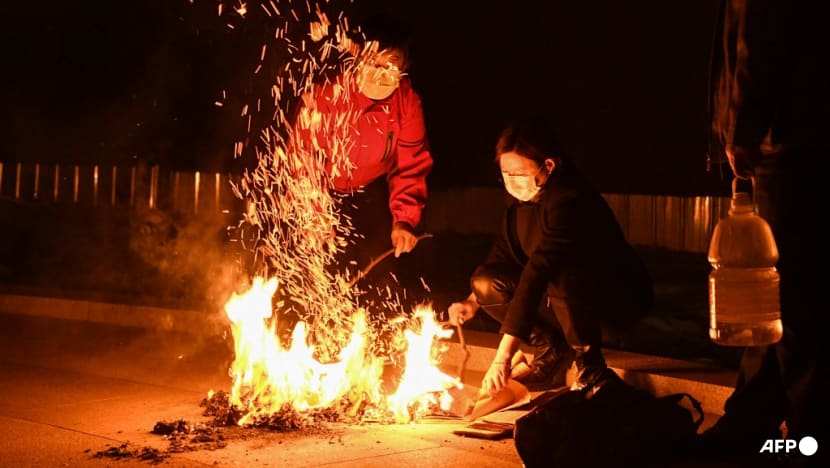Chinese cities spark outcry with ban on joss paper sales and ‘feudal superstitions’ for Qing Ming Festival

People burn paper money on a sidewalk on the eve of Qing Ming, the Tomb Sweeping festival, when Chinese honour their ancestors, in Beijing on Apr 3, 2021. (File photo: AFP/Greg Baker)

South China Morning Post
05 Apr 2024 05:31PM (Updated: 05 Apr 2024 06:03PM)
Local governments across China have provoked an outcry on social media by cracking down on the burning of joss paper and other offerings during this year’s Qing Ming Festival - a tradition they have described as "feudal superstition".
The city of Nantong in the eastern province of Jiangsu announced a ban late last month on the manufacturing and selling of spirit money, joss paper and other supplies for the holiday, also known as tomb-sweeping day.
The ban aims to “promote funeral and burial reforms” and advocate for "civilised" customs and practices, according to an announcement released last week.
The city warned of fines, administrative penalties and even criminal prosecution for those found violating the rules.
During Qing Ming Festival, Chinese families visit the tombs of their ancestors, clean their gravesites and make ritual offerings to the dead in a solemn ceremony of remembrance.
Offerings typically include traditional food dishes and the burning of joss sticks, incense paper, and paper replicas of items such as mansions, cars, and luxury bags for ancestors to use in the afterlife.
This is not the first time authorities have targeted Qing Ming rituals with bans or other restrictions.
China’s Cabinet, the State Council, banned manufacturing and sales of joss paper and similar items in 2012, when it revised the country’s funeral management regulations. Local governments then revised their own policies based on the national rules.
However, these prohibitions went largely unnoticed by the public until Nantong’s announcement on WeChat a week ahead of this year’s holiday, which fell on Thursday.
The announcement sparked an uproar on Chinese social media with many users defending the preservation of folk customs and objecting to what they saw as a one-size-fits-all regulation.
"(The authorities) talk about preserving culture and traditions ... while they keep imposing bans on this and that," one commenter wrote on the Chinese social media platform Weibo. "Future generations will have no idea what the true and normal traditions are."
Another said: "Some (traditions) still need to be complied with, and it is the only way we can find solace to express our longing for departed loved ones."
Meanwhile, others approved of the ban and suggested alternative ancestor worship rituals, such as offering fresh flowers and virtual tomb-sweeping, which they said were more eco-friendly and did not pose a risk of wildfires.
In 2021, Nantong recorded a total of 210 incidents related to the holiday, including 121 fires, according to an article published by city authorities that year.
Local governments across China have been promoting "civilised rituals" in recent years and have issued bans on "superstitious" activities during traditional Chinese holidays such as Qing Ming Festival, the Hungry Ghost Festival and Chinese New Year.
Heyuan in Guangdong province, Xunyang in Shaanxi province, and a district of Ezhou in Hubei province also announced prohibitions this year.
In addition to banning the production and sale of ritual supplies, some governments have prohibited mournful music, the burning of joss paper, the construction of mourning halls and displaying of corpses in public.
Following the ban, Nantong authorities urged people to honour the dead “in a modest and non-extravagant manner, using simple and plain methods” and to adopt environmentally friendly practices.
"(We should) integrate the remembrance of the deceased with the promotion of exemplary family values, shifting the focus from physical tomb-sweeping to spiritual inheritance, and consciously resist feudal superstitious practices and advocate for a civilised new culture," they said.
The ban prompted a dissent from the country’s state-run media, with China National Radio calling the measure “too crude and heavy-handed”.
"In people’s everyday perception, burning joss paper is just one aspect of tomb-sweeping, similar to offering flowers as an expression of remembrance. It cannot be regarded as a feudal superstition," the radio network’s news channel said.
"This kind of management is rigid, impractical, and lacks human touch. It should be treated with caution."
An official from the Nantong Municipal Civil Affairs Bureau said the ban was issued in the interest of “spiritual civilisation construction and environmental protection” and was based on relevant laws and regulations, according to China National Radio.
"It is unrelated to the solemn remembrance and respect that people have for their ancestors," the official said. "We emphasise the prohibition of manufacturing and selling in terms of market behaviour, but there is no mention of prohibiting the use."
This article was first published on SCMP.

